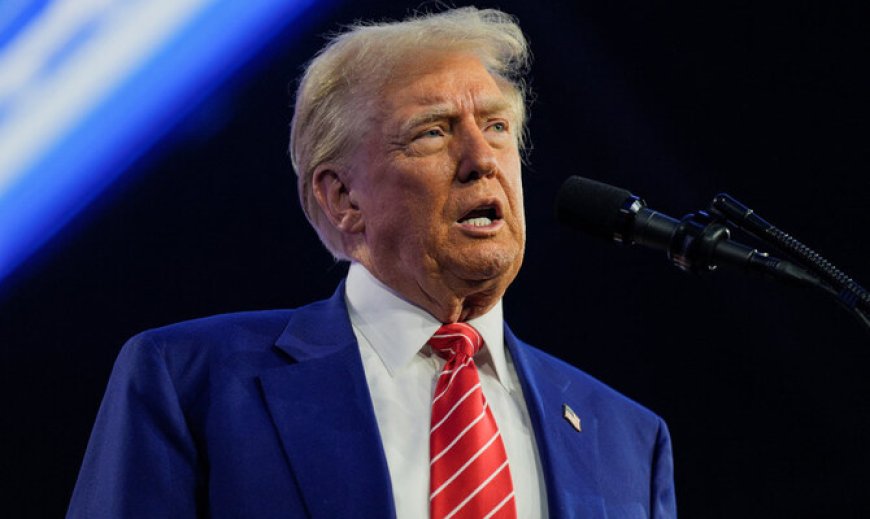Trump's Push for Death Penalty Sparks Debate After Biden’s Commutations
The next president's stunning vow to "vigorously pursue" the death penalty upon taking office is a direct reaction to Vice President Joe Biden's decision to commute the sentences of the majority of federal death row inmates.

The next president's stunning vow to "vigorously pursue" the death penalty upon taking office is a direct reaction to Vice President Joe Biden's decision to commute the sentences of the majority of federal death row inmates. In a move partly intended to forestall Trump from possibly reinstituting the executions of 37 federal death row inmates, Biden recently moved to convert their sentences to life imprisonment without parole, and this populist promise follows on the heels of that.
Trump strongly criticized Biden's commutations, saying that they were unfair and hurt the victims' families. After Joe Biden commuted the death sentences of 37 of the greatest offenders in our nation, Trump took to social media to express his disapproval of the move. You won't believe he pulled this off until you hear what he accomplished. I don't understand. Even more upset are friends and relatives. Quite the surprise, isn't it?
The harsh position on law and order that Trump advocated for during his prior administration is being echoed in his statements by Trump. Still, we don't know how realistic his suggestions are. Trump has often voiced his desire for more authority over the Justice Department, even though presidents usually do not dictate the punishments sought by federal prosecutors. He has made a solemn promise to seek the death penalty for "violent rapists, murderers, and monsters," but details of his strategy are hazy at best.
A Political Analysis of the Death Penalty
The statement made by Trump is not totally unexpected. Killings of police officers, victims of human trafficking, and those whose deaths were caused by drugs were among the many crimes he repeatedly advocated for while campaigning for president. But law scholars like Ohio State University's Douglas Berman worry that Trump is more concerned with energizing his audience than presenting concrete policies.
Rather than the federal government handling the majority of capital punishment cases, Berman pointed out that states are responsible for this task. The number of federal death row detainees was 40 before Biden's commutations, while the number of state criminals sentenced to death was over 2,000. If the Trump administration attempted to reverse state decisions to abolish the death penalty or take control over murder cases at the state level, it would encounter enormous legal and practical obstacles.
On top of that, Trump has made statements that suggest he may reconsider previous decisions that have held that capital punishment is excessive for certain crimes, such as rape. According to legal experts, this change would take a long time to implement and would encounter opposition from advocacy organizations and the courts.
Views of the Public and Their Historical Background
In the last 20 years, fewer and fewer Americans have favored capital punishment. In 2007, seven out of ten Americans supported the death penalty for murder, but by 2024, that number had dropped to roughly half. Wrongful convictions and racial sentencing inequalities are two systemic problems that have recently come to light, and this decrease reflects that.
This change in popular opinion is consistent with Biden's decision to commute the sentences of the majority of federal death row convicts. Supporters of capital punishment, including the American Civil Liberties Union and the United States Conference of Catholic Bishops, see this as a positive step toward decriminalizing the death penalty. But Biden has kept three notorious killers on death row: Dylann Roof (who murdered 25 people in a Charleston church in 2015), Dzhokhar Tsarnaev (who bombed the Boston Marathon in 2013), and Robert Bowers (who shot 11 people in a Pittsburgh synagogue in 2018).
Debate Over Victims
Trump has used the horrific details of individual instances to support his case for bringing the death penalty back. He brought attention to the case of Thomas Steven Sanders, who killed a mother and her daughter, and Jorge Avila Torrez, a former Marine found guilty of numerous killings, including those of two girls. The story put forth by Trump gains emotional support from the victims' families who have voiced their anger at Biden's commutations.
However, detractors contend that Trump's obsession with retribution obscures more fundamental concerns regarding the equity and efficacy of capital punishment. Those who want to see the death penalty abolished cite the indestructibility of erroneous executions and the growing body of research showing institutional bias.
An Intersection for Fairness
With his campaign promise to "vigorously pursue" the death penalty, Trump is further dividing American opinion on criminal justice as he gets ready to assume office. Contrasted with Trump's pledges, which show a return to punitive policies that focus punishment over rehabilitation, Biden's commutations indicate a move toward reform.
In the years to come, the larger discussion surrounding the death penalty will undoubtedly heat up, bringing Americans face-to-face with moral, equitable, and governmental problems regarding the administration of justice. No matter what happens with Trump's plans, they will influence the way we talk about crime and punishment in the country.













































